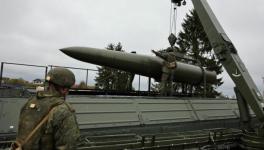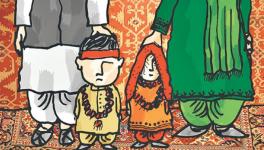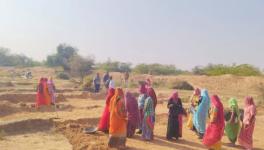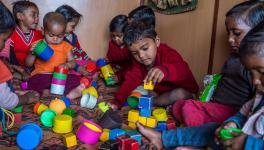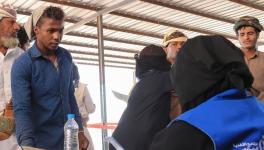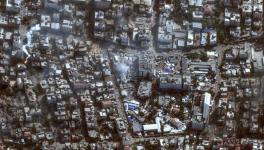Saudi and UAE War on the Children of Yemen: A UNICEF Report
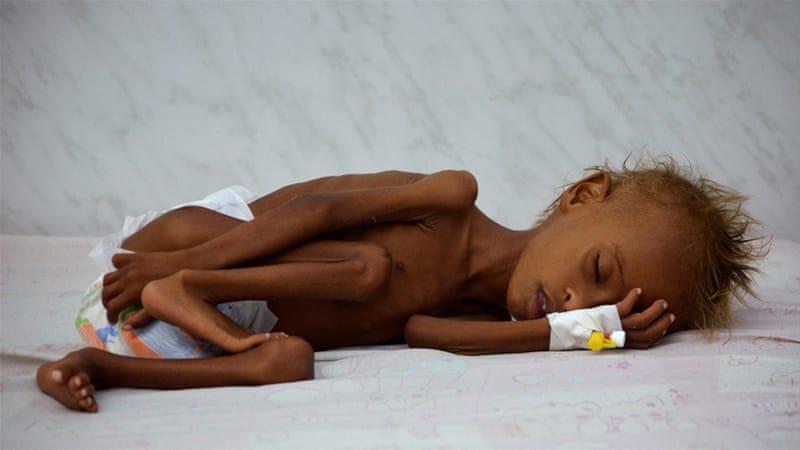
As the ‘forgotten war’ in Yemen enters its fourth year, the cost of human suffering is turning more and more enormous. Saudi Arabia and UAE's genocidal war against Yemen, assisted by the US and the UK, has taken a devastating toll, particularly on the most vulnerable members of society – the children. Most have been reduced to skin and bones, under conditions of life-threatening malnutrition.
Geert Cappealaere, the UNICEF Regional Director for the Middle East and North Africa, recently returned from a field visit to Yemen. Her report has some very hard-hitting observations.
“I wanted to share with you the impact that three years of brutal war and decades of chronic underdevelopment are having on 11 million Yemeni boys and girls,” she observes in her report.
The ongoing crisis is one of the worst humanitarian crisis the world is currently seeing. According to her report, in 2017 alone, a minimum of five children were being killed or seriously injured every single day. The same year also saw outbreaks of deadly diseases such as cholera and diphtheria, killing hundreds of children in its wake.
In 2015, because of Yemen’s underdevelopment, 200,000 children suffered from severe acute malnutrition – life-threatening malnutrition. With three years of war, this has doubled, making Yemen among the three countries with the highest number of acutely malnourished children in the world.
Geert writes that in the past two weeks, the international community, along with the local heroes, the health and humanitarian workers in Yemen, have managed to stem the cholera outbreak after many months. But in a few weeks, the rainy season will start and cholera will hit the children of Yemen once more.
“Three years of war, decades of underdevelopment have done more to children than the confrontation with death, life-threatening preventable diseases,” mentions the report.
Along with the health crisis, the children of Yemen are constantly under an educational crisis. Compared to three years ago, half a million more children are not able to go to school anymore. Close to two million Yemeni boys and girls are not attending school or never had a chance to. The reason being that 2,500 schools in the country have either been destroyed by the war, or are being used for military purposes, or for hosting displaced families.
There is also the other fact that 80 per cent of the population is suffering from severe poverty. And this is just a rough estimate. Thus a large number of parents are sending their children to beg on the streets instead of sending them to schools. They are marrying them off at an early age so that they have ‘one less mouth to feed in the family’.
“Sending your child to beg, sending your child to work, marry your girl at an early age, are not choices that any Yemeni father or mother want to make. It is not a choice, it is forced on them because of this brutal war,” Geert observes in the report.
During her trip, Geert visited a group of 12-13-year-old girls outside San’a, all of whom were livid with anger and frustration at the state of education in their country.
She says that one of the girls, showed her a textbook that was at least 30-40 years old and said, “We need to learn from this? How can we ever become the doctors, the teachers, the engineers that Yemen so badly needs if we need to learn from this?”
Is there a solution to all of this? Yes. And the first one is putting an end to this brutal war in Yemen. It’s a senseless war from a children’s perspective and no single boy or girl understands what this is all about. Second, there can be no negotiations with any party regarding access to safe drinking water or cholera vaccination.
“We are losing time, energy and money on conversations that should never happen. Access to humanitarian supplies, supplies that are needed to be delivered against the acute needs of the population cannot and shall not be negotiated,” notes Geert.
Investment in education is a must if the world does not want to deprive two million children of education. It needs to be prioritised and now.
Yemen was once called “Arabia Felix” – the happy Arabia - but not much of the happiness remains there today. It will only come back to Yemen, if the world agrees to invest in children, stop the brutal war and invest in education.
Get the latest reports & analysis with people's perspective on Protests, movements & deep analytical videos, discussions of the current affairs in your Telegram app. Subscribe to NewsClick's Telegram channel & get Real-Time updates on stories, as they get published on our website.









